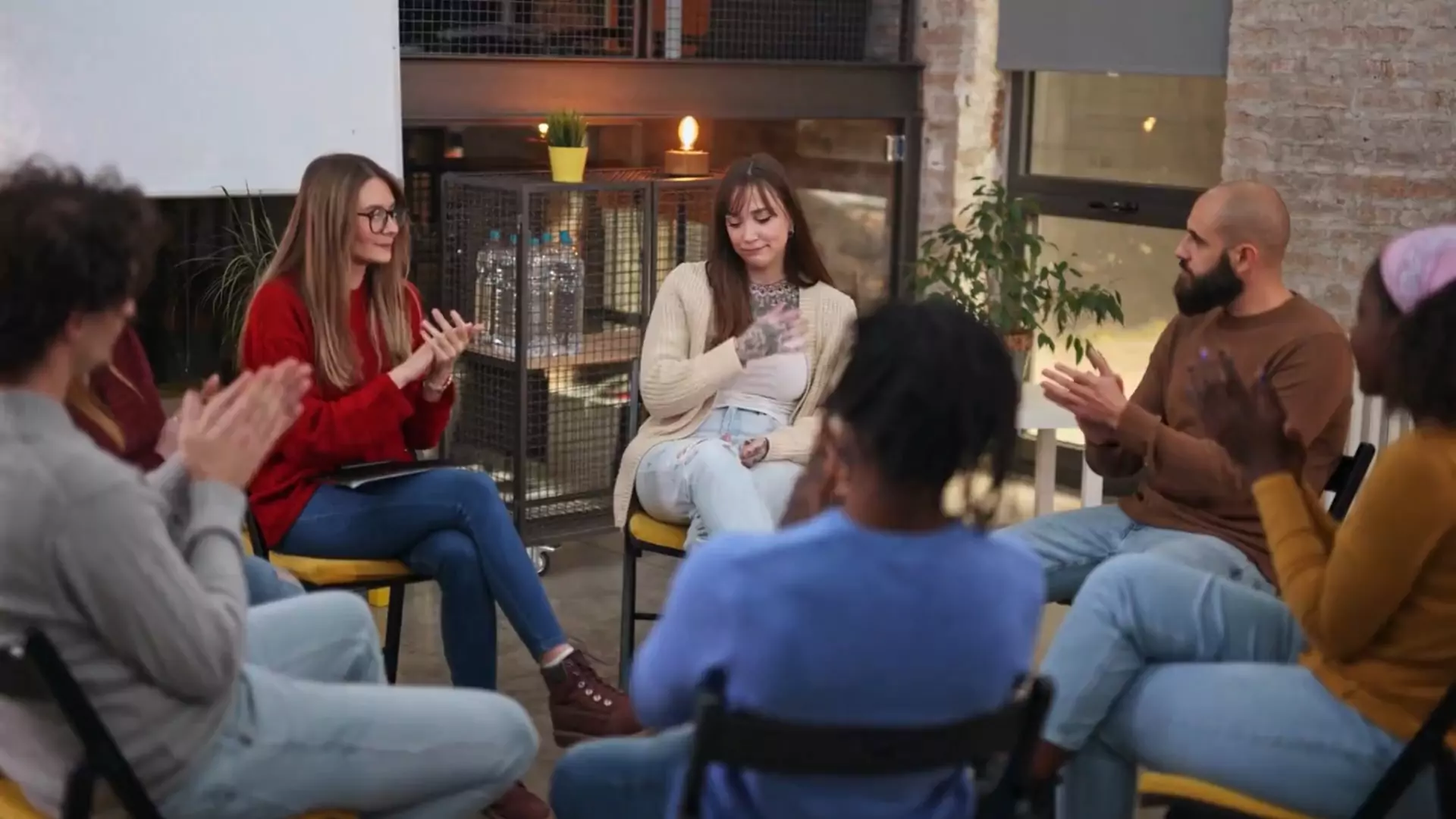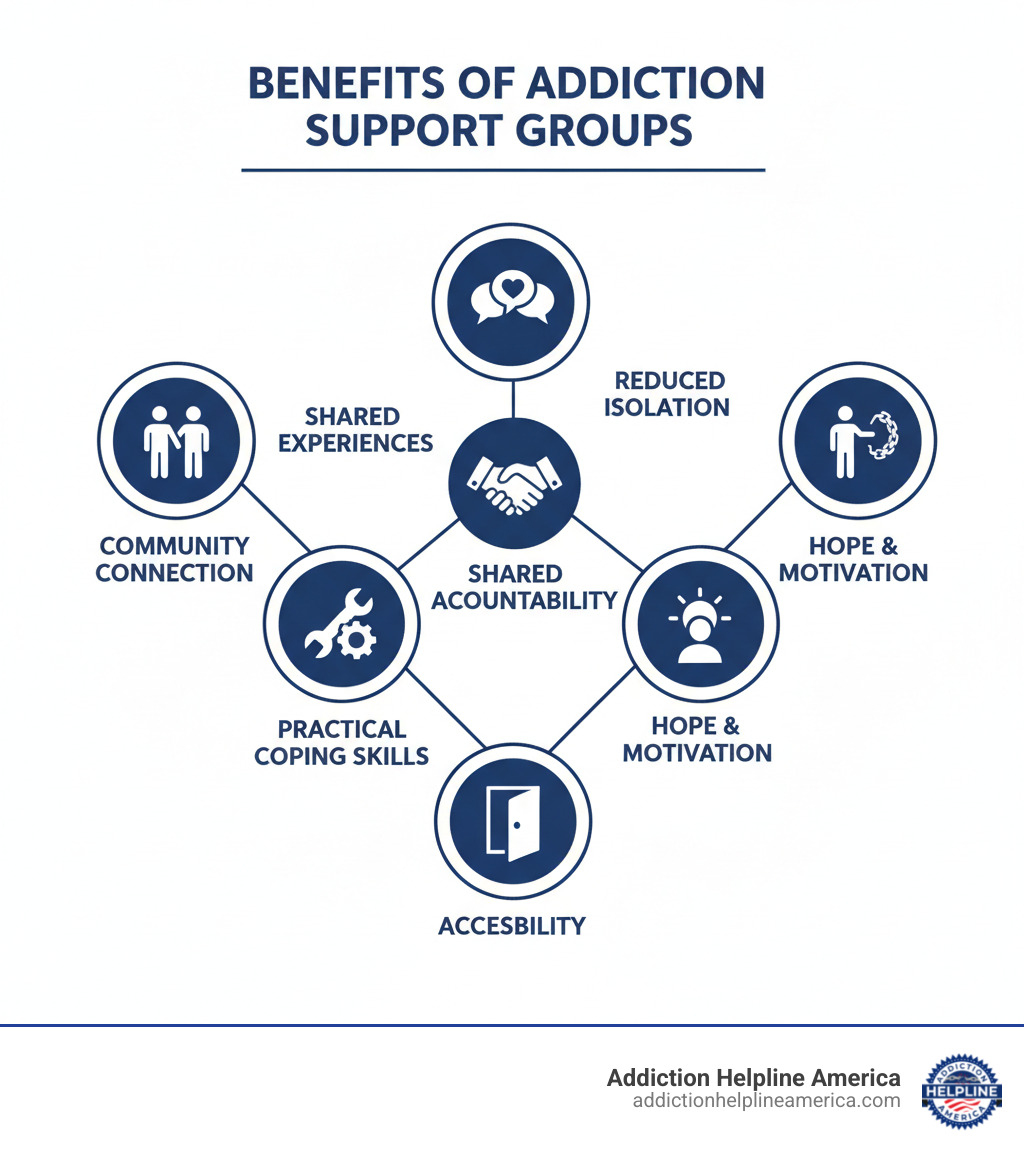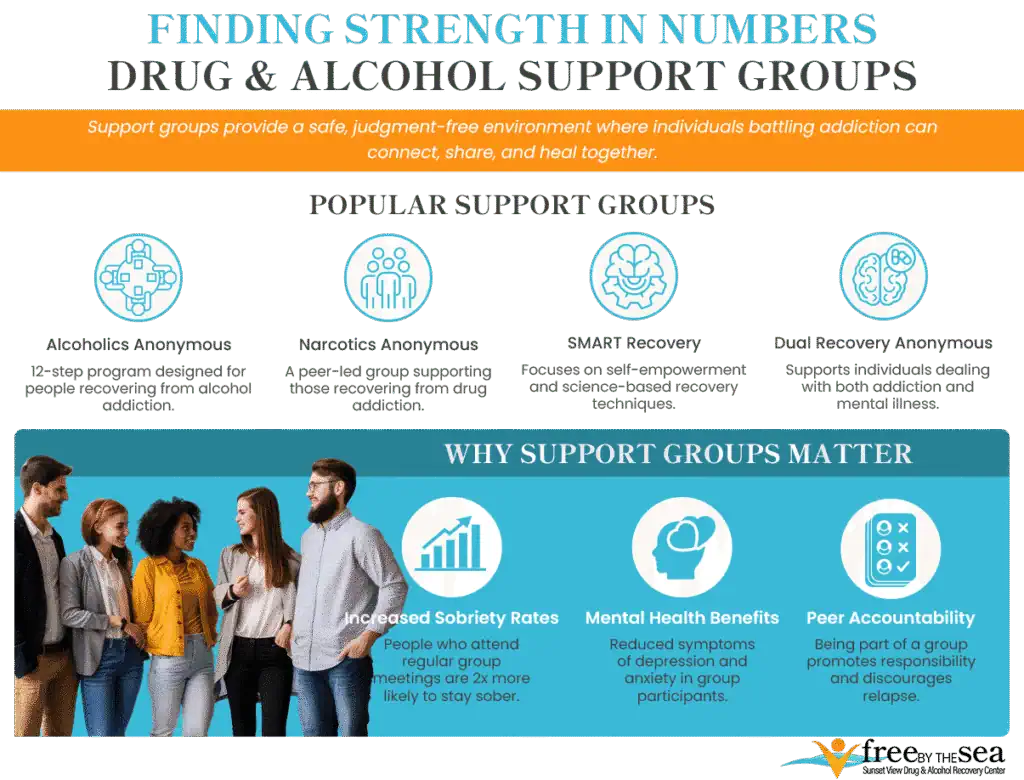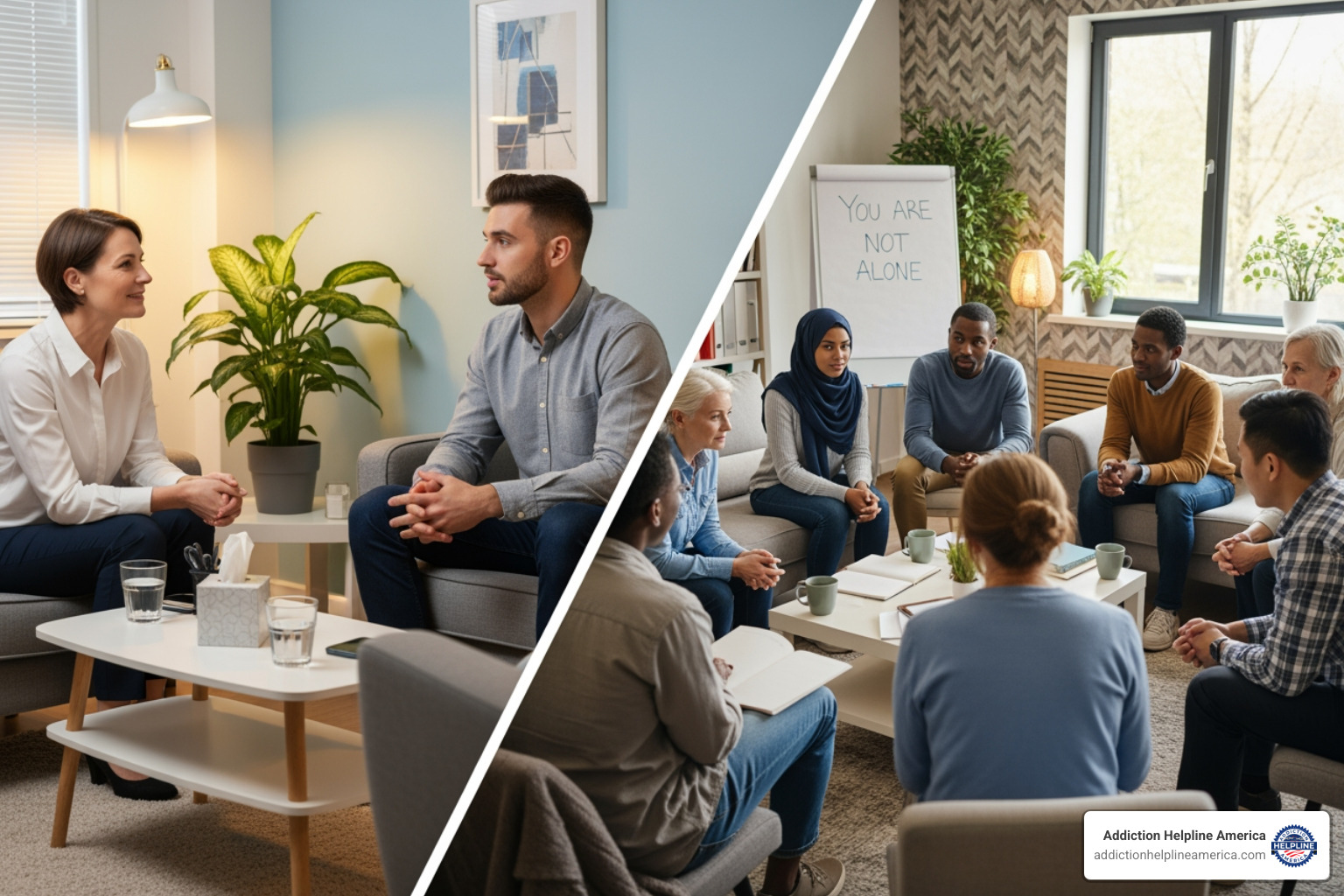
Why Addiction Support Groups Matter in Your Recovery Journey
Addiction support groups are community-based meetings where people with substance use challenges gather to share experiences and work toward recovery together. These groups offer a safe space to connect with others who understand your struggles, reducing shame and isolation while building hope for lasting change.
Quick Overview: Addiction Support Groups
- What they are: Peer-led meetings focused on mutual support for recovery.
- Who they help: Individuals with substance use disorders and their loved ones.
- Main types: 12-step (AA, NA), self-empowerment (SMART Recovery), and faith-based groups.
- Key benefits: Emotional support, practical coping skills, accountability, and hope.
- Cost: Most groups are free.
Support groups work by connecting you with people who’ve walked the same path. Research shows that participation promotes better long-term outcomes. Whether you prefer a structured 12-step approach or a secular, skills-based model, there’s a group that fits your needs.
At Addiction Helpline America, we’ve helped thousands steer the landscape of addiction support groups and treatment options. We understand it can be confusing to know where to start, which is why we offer free, confidential guidance 24/7 to help you find the support that works for you.

Terms related to addiction support groups:
1. What Are the Different Types of Addiction Support Groups?
When you start looking into addiction support groups, the number of options can feel overwhelming. This variety exists because recovery is not one-size-fits-all. What works for one person might not click for you, and that’s okay.
Some groups follow a spiritual path, while others take a science-based approach. Some are led by peers, while others have trained facilitators. The key is finding a community where you feel comfortable, supported, and empowered to build the life you want.

Common Support Group Models
The most recognizable addiction support groups follow the 12-step model, which began with Alcoholics Anonymous in 1935. These programs guide members through twelve steps of self-reflection, making amends, and helping others. They emphasize spirituality and belief in a “higher power,” which members are free to interpret in their own way.
- Alcoholics Anonymous (AA) is the original 12-step program. Its message is to admit you cannot control alcohol alone, believe a higher power can help, and work the steps with others.
- Narcotics Anonymous (NA) applies the same 12-step philosophy to all drug addictions, with tens of thousands of weekly meetings worldwide.
- Dual Recovery Anonymous (DRA) is a 12-step program designed for those with co-occurring disorders, addressing both addiction and mental health challenges simultaneously.
Substance-specific 12-step groups like Cocaine Anonymous, Crystal Meth Anonymous, and Marijuana Anonymous offer focused environments for people facing similar challenges. A core feature of 12-step programs is sponsorship, where an experienced member guides a newcomer through the steps, providing personal support. Research shows having a sponsor improves long-term abstinence.
Call Now – Your Journey to Recovery Begins Today!

Take the first step towards a healthier life! Call now to connect with our compassionate team and start your recovery journey today. Your path to healing awaits!
Our recovery specialists are available 24/7 to provide support, and all calls are confidential and free. Reach out anytime – we’re here to help!
Self-Empowerment and Skills-Based Groups
For those who prefer a non-spiritual approach, self-empowerment groups focus on practical, science-based tools. These groups are often led by trained facilitators.
- SMART Recovery (Self-Management and Recovery Training) uses principles from cognitive behavioral therapy to help you change addictive thoughts and behaviors. It focuses on four points: building motivation, coping with urges, managing thoughts and feelings, and creating a balanced life.
- Secular Organizations for Sobriety (SOS) emphasizes personal responsibility and self-empowerment, viewing sobriety as entirely separate from religion or spirituality.
- LifeRing Secular Recovery is based on the idea of strengthening your “sober self” over your “addicted self.” Members design their own recovery programs with peer support.
- Women for Sobriety (WFS) is a secular program exclusively for women, using positive affirmations and building self-worth to create a safe, supportive space.
Finding Specialized Addiction Support Groups
Beyond these models, you can find groups custom to specific communities and situations.
- For Families: Al-Anon and Alateen (for teens) provide crucial support for family and friends of people with alcohol problems, helping them cope and set healthy boundaries. Similar groups exist for families affected by drug addiction.
- Faith-Based Groups: Programs like Celebrate Recovery (Christian), JACS (Jewish), Millati Islami (Islamic), and Buddhist Recovery integrate spiritual teachings with recovery principles.
- Behavioral Addictions: Groups like Overeaters Anonymous and Gamblers Anonymous use a similar peer-support model to address compulsive behaviors beyond substance use.
Whatever your background or beliefs, there is likely a group designed with you in mind. Finding it just takes some exploration, and we’re here to help you steer the options.
2. What Are the Benefits and Limitations?
When you join an addiction support group, you’re stepping into something that can genuinely change your life. But it’s important to understand both what these groups offer and where they have their limits.
The Power of Peer Support in Addiction Recovery
There’s something powerful about a room where everyone just gets it. The shared understanding in addiction support groups is one of their greatest gifts. The shame and isolation that fuel addiction begin to fade when you realize you’re not alone. Seeing others who were once where you are now—and are thriving in recovery—sparks hope and motivation.
Beyond emotional support, these groups are sources of practical wisdom. Members share real, battle-tested strategies for managing cravings, avoiding triggers, and handling stress. The group also provides accountability. When you share your goals, you’re more likely to follow through, and studies show that consistent attendance is linked to long-term abstinence. Celebrating milestones together reinforces progress, and when someone stumbles, the group offers empathy, not judgment.
We’ve seen countless people find their footing through the connections made in support groups. This community of understanding, uplift, and accountability creates a strong foundation for lasting recovery.
More on the journey to sobriety
Peer Support vs. Professional Treatment
Addiction support groups and professional treatment are teammates, not competitors. They work best together.

Peer support groups offer the power of lived experience. They are typically free, widely accessible, and provide emotional connection, shared wisdom, and a sense of belonging.
Call Now – Your Journey to Recovery Begins Today!

Take the first step towards a healthier life! Call now to connect with our compassionate team and start your recovery journey today. Your path to healing awaits!
Our recovery specialists are available 24/7 to provide support, and all calls are confidential and free. Reach out anytime – we’re here to help!
Professional treatment brings clinical expertise. Licensed therapists provide evidence-based therapies, diagnose co-occurring mental health conditions, and create individualized treatment plans. They address the deeper psychological and medical aspects of addiction.
Think of it this way: professional treatment provides the map and expert navigation, while peer support groups are your fellow travelers who offer encouragement and share their knowledge of the trail ahead. Many people transition from intensive treatment to ongoing peer support for aftercare, while others attend groups and therapy simultaneously.
However, peer groups have limitations. They are not a substitute for professional therapy, especially for severe withdrawal or complex co-occurring conditions like bipolar disorder or PTSD. While many appreciate the organic flow of peer-led meetings, some may prefer the structure of professional therapy. If a group’s philosophy doesn’t fit, it’s okay to try another.
At Addiction Helpline America, we help people steer both worlds—connecting you with professional treatment programs and helping you find the right support groups. Recovery isn’t one-size-fits-all, and you deserve support that fits your unique needs.
Learn about Bipolar Disorder Psychotherapy
3. How Do I Choose the Right Group for My Needs?
Finding the right addiction support groups is a personal process. What feels supportive for one person may not be the right fit for you. The key is to reflect on what matters most in your recovery journey.
Start by considering your personal beliefs. Do you prefer the spiritual framework of 12-step programs or the secular, skills-based approach of groups like SMART Recovery? Neither is better—it’s about what resonates with you. Also, think about the group environment. Would you feel more comfortable in a gender-specific group, or one focused on a particular substance?
Logistics matter, too. Do you prefer the face-to-face connection of in-person meetings, or does the flexibility of online groups better fit your life? You’re not locked into your first choice. Feel free to try several groups to find one that feels constructive and encouraging. It’s a bit like learning How to Choose the Right Rehab—it requires honest self-reflection.
Finding Support for Co-Occurring Mental Health Conditions
Many people with a substance use disorder also struggle with mental health issues like depression, anxiety, or PTSD. This is known as a “dual diagnosis” or co-occurring condition. Lasting recovery requires addressing both issues at the same time through integrated treatment.
Specialized addiction support groups like Dual Recovery Anonymous (DRA) were created for this purpose. DRA uses a 12-step framework adapted to help members manage both their substance use and mental health symptoms. Many general support groups also welcome discussions about mental health. Taking care of your mental health is a vital part of recovery, and we can help you find resources for More on Depression Treatment and other support.
Culturally Sensitive Resources for Indigenous Peoples
For Indigenous peoples, recovery is often intertwined with traditional healing practices, cultural ceremonies, and community connection. Programs that honor these traditions can be more effective than generic approaches.
These culturally sensitive programs take a holistic approach, addressing the mental, emotional, and spiritual dimensions of addiction alongside the physical. They recognize that healing often means restoring cultural ties and addressing historical trauma. These programs might incorporate teachings from elders, connection to the land, and other practices that honor Indigenous heritage.
If you are an Indigenous individual seeking recovery resources that honor your culture, Addiction Helpline America can help. We are committed to connecting you with programs from our nationwide network that prioritize cultural understanding and traditional healing practices.
4. How Can I Access Addiction Support Groups?
Finding an addiction support group is easier than you might think. These programs are designed to be accessible, with options that fit your lifestyle, comfort level, and schedule.
Finding In-Person Meetings
There’s a powerful sense of community in-person meetings. The most reliable way to find local meetings for groups like Alcoholics Anonymous, Narcotics Anonymous, or SMART Recovery is by visiting their official websites, which have up-to-date directories. You can search for meetings by city, state, or zip code.
- Alcoholics Anonymous meeting finder
- Narcotics Anonymous meeting search
- SMART Recovery meetings
Your local community is also full of resources. Community centers, hospitals, and treatment facilities frequently host support groups. Check their bulletin boards or ask staff for information. Many places of worship also open their doors to recovery groups, including both faith-based and secular programs.
If you’re unsure where to start, a national treatment locator can help you find services in your area, such as the SAMHSA treatment locator. Many states also maintain their own directories of behavioral health and recovery resources.
Exploring Online and Virtual Addiction Support Groups
If you can’t make it to an in-person meeting, virtual groups are an excellent alternative. They are ideal if you live in a rural area, work odd hours, have mobility challenges, or simply prefer the privacy of your own home.
Virtual meetings remove geographical barriers and offer significant anonymity. It can be easier to open up from your own space, and the flexibility is remarkable, with meetings available around the clock. Major organizations like AA, NA, and SMART Recovery offer virtual meetings through video platforms; you can typically find links and instructions on their websites. Some, like SMART Recovery, even have mobile apps with recovery tools and meeting access.
Beyond live meetings, online forums and chat communities provide 24/7 connection, allowing you to reach out for support anytime. Technology has transformed recovery, creating bridges where barriers once stood. The role of technology in recovery continues to grow, offering new opportunities for support.
At Addiction Helpline America, we understand that taking the first step can feel daunting. We’re here to help you steer these options and connect you with resources that fit your situation. Recovery support is out there, and we’ll help you find it.
5. How Do Support Groups Fit into a Broader Recovery Plan?
Recovery is not about a single solution; it’s about building a strong foundation from multiple sources of support. Addiction support groups are a powerful component, but they work best as part of a broader plan that may also include professional treatment, therapy, and lifestyle changes.
Support groups are flexible and can meet you wherever you are in your journey—whether you’re just starting out, stepping down from intensive treatment, or maintaining long-term sobriety.
Complementing Professional Treatment Programs
Lasting recovery is often achieved by weaving together peer support with professional clinical care. Research shows that addiction support groups significantly increase success rates when combined with therapy. The two strengthen each other.
Professional therapists provide clinical expertise and evidence-based interventions, helping you address the root causes of addiction and any co-occurring mental health conditions. You can explore different approaches in our guide on Types of Addiction Therapy.
Meanwhile, support groups offer a real-world testing ground for the skills you learn in therapy. They provide a space to practice vulnerability and accountability with peers who understand. Many people encounter support groups as part of their aftercare plan following Inpatient Drug Rehab Programs. As you transition back to daily life, these groups provide crucial, consistent support to help prevent relapse.
Call Now – Your Journey to Recovery Begins Today!

Take the first step towards a healthier life! Call now to connect with our compassionate team and start your recovery journey today. Your path to healing awaits!
Our recovery specialists are available 24/7 to provide support, and all calls are confidential and free. Reach out anytime – we’re here to help!
The Role of Support Groups in Long-Term Sobriety
Recovery is a lifelong journey, and addiction support groups play an essential role in sustaining it. The stories you hear in meetings provide ongoing motivation, reminding you why you’re doing this hard work.
Relapse prevention is a cornerstone of long-term participation. In meetings, you learn to identify triggers, recognize warning signs, and develop coping strategies in a supportive environment. This proactive approach builds resilience and confidence.
Perhaps most importantly, support groups help you build a new social network centered on sobriety. Addiction often leads to isolation or relationships that revolve around substance use. In recovery, you need friends who understand and support your commitment. The connections you form in groups often become genuine friendships that extend beyond the meeting room.
Life will always present challenges. Having a consistent group to turn to provides an invaluable safety net, ensuring you never have to face the journey alone.
At Addiction Helpline America, we understand that creating a comprehensive recovery plan can be overwhelming. That’s why we’re here to help you steer all your options—from finding the right professional treatment to connecting with supportive communities. Recovery is possible, and we’re committed to walking alongside you.
Conclusion
If you’ve made it this far, you’ve already taken an important step by learning about the many paths to recovery. We know that exploring addiction support groups can feel overwhelming, but the variety of philosophies and formats means there is likely a group that fits your unique needs and goals.
Whether you’re drawn to the spiritual foundation of 12-step programs, the science-based approach of SMART Recovery, or a secular or faith-based community, each path offers connection, hope, and practical tools. The right group is the one where you feel heard, understood, and empowered.
Finding your fit might take some trial and error, and that’s okay. What matters most is that you stay open to the support that’s available. Addiction support groups provide a community where you can celebrate wins, work through struggles, and remember you’re not alone.
At Addiction Helpline America, we have walked alongside thousands as they’ve steerd the landscape of recovery resources. We know how hard it is to figure out where to start, which is why we offer free, confidential, and personalized guidance 24/7. Our team can help you explore your options and connect you with the right support group or treatment program from our vast nationwide network. You don’t have to do this on your own.
Reach out today, and let’s find the right path forward together.
Find confidential help now through our addiction and rehab hotlines
Our helpline is 100%
free & confidential
If you or someone you care about is struggling with drug or alcohol addiction, we can help you explore your recovery options. Don’t face this challenge alone—seek support from us.
Programs
Resources
Will my insurance
cover addiction
treatment?
We're ready to help
Find the best
drug or alcohol treatment
center
Are you or a loved one struggling with addiction? Call today to speak to a treatment expert.















